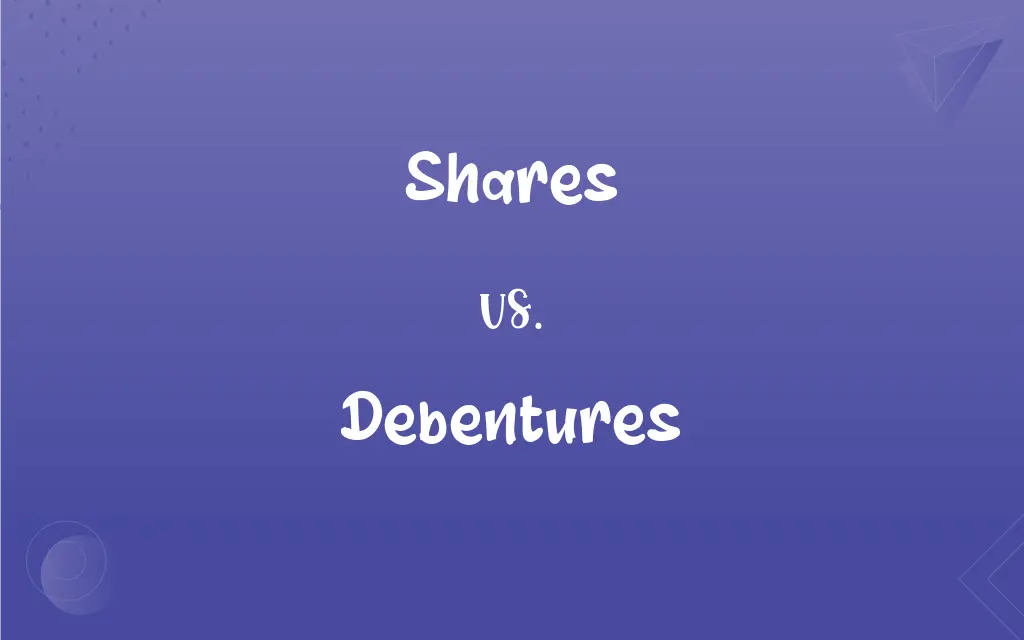Shares vs. Debentures: What's the Difference?
Edited by Janet White || By Harlon Moss || Updated on October 19, 2023
Shares represent ownership in a company, whereas debentures are debt instruments issued by a company.

Key Differences
Shares are essentially a slice of ownership in a company. When someone buys shares, they are buying a piece of the company and become a shareholder. Debentures, on the other hand, represent a loan made by the investor to the company. While shares come with ownership rights, debentures come with lending rights.
Shares provide the holder with a claim on the company's profits, typically in the form of dividends. The dividends on shares can be variable, depending on the company's profitability. Debentures, conversely, provide the holder with a claim to interest payments, which are typically fixed and predetermined.
Shares offer the potential for capital appreciation if the company's stock price goes up. The value of shares can be volatile, as they are influenced by various market factors. Debentures offer a return in the form of interest payments, and their value is generally more stable, since they are influenced mainly by interest rates.
When it comes to the hierarchy of claims, shares are considered equity, which means shareholders are last in line to be paid in case the company goes bankrupt. Debentures are a form of debt, so debenture holders are paid before shareholders in the event of a company's liquidation.
The risk associated with shares is generally higher than that of debentures. While shareholders might earn high returns if the company performs well, they also face the risk of losing their investment if the company underperforms. Debenture holders, being creditors, have a higher claim and thus face comparatively lower risk, but they also have a capped return in the form of interest.
ADVERTISEMENT
Comparison Chart
Nature
Ownership in the company
Debt instruments
Return
Dividends (variable)
Interest (fixed)
Risk
Higher (variable returns)
Lower (fixed returns)
Claim Priority
Last in case of liquidation
Before shareholders
Price Stability
More volatile
More stable
ADVERTISEMENT
Shares and Debentures Definitions
Shares
A unit of ownership in a company.
I bought 50 shares of Apple today.
Debentures
A long-term loan certificate issued by a company.
The company issued debentures to raise capital.
Shares
A portion of a company's equity capital.
He holds significant shares in the startup.
Debentures
Tradable debt securities in the financial market.
He traded his debentures in the stock market today.
Shares
A claim on a company's earnings and assets.
The shares I own entitle me to dividends.
Debentures
A debt instrument not secured by physical assets.
These debentures are unsecured, relying on the company's creditworthiness.
Shares
Represents a shareholder's voting rights.
With more shares, you have greater influence in company decisions.
Debentures
Provides periodic interest payments to the holder.
I receive a 5% interest yearly from my debentures.
Shares
Tradable securities that can appreciate or depreciate in value.
The value of my shares doubled in a year.
Debentures
Represents a fixed charge on the company's earnings.
The company must honor its debenture commitments before dividends.
Shares
A part or portion belonging to, distributed to, contributed by, or owed by a person or group
The pirates argued over their shares of the treasure.
Debentures
A certificate or voucher acknowledging a debt.
Shares
An equitable portion
Do one's share of the work.
Debentures
An unsecured bond issued by a civil or governmental corporation or agency and backed only by the credit standing of the issuer.
Shares
One of the equal parts into which the capital stock of a company is divided
Bought 200 shares of the company's stock.
Debentures
A customhouse certificate providing for the payment of a drawback.
Debentures
Plural of debenture
FAQs
Are debentures secured?
Some debentures are secured by assets, while others are unsecured.
What are debentures?
Debentures are long-term debt instruments issued by a company.
How do shareholders earn money?
Shareholders earn through dividends and by selling shares at a higher price than purchased.
How do shares differ from debentures?
Shares signify ownership, while debentures represent borrowed capital.
Who has a higher claim in case of company liquidation?
Debenture holders have a higher claim than shareholders.
What happens if a company defaults on its debenture payments?
Legal action can be taken by debenture holders.
What are shares?
Shares represent a unit of ownership in a company.
Do shares provide fixed returns?
No, returns on shares, called dividends, can be variable based on company performance.
Are debentures transferrable?
Yes, debentures can be bought or sold in financial markets.
Can a company issue both shares and debentures?
Yes, companies often have a mix of equity (shares) and debt (debentures).
Are all debentures long-term?
Most are long-term, but there can be short-term debentures as well.
Can shares be traded?
Yes, shares are often traded on stock exchanges.
What influences share prices?
Multiple factors, including company performance, industry trends, and market sentiment.
How is the interest rate for debentures determined?
It's based on the company's creditworthiness and prevailing market rates.
Do all shares carry voting rights?
Not necessarily; there are both voting and non-voting shares.
Do shareholders have a say in company management?
Yes, shareholders typically have voting rights based on their shares.
What do debenture holders get in return?
Debenture holders receive periodic fixed interest payments.
Which is riskier - shares or debentures?
Shares generally carry higher risk due to variable returns.
Is it common for individual investors to buy debentures?
Yes, debentures are a popular fixed-income investment for many individual investors.
Is the interest on debentures guaranteed?
Yes, unless the company defaults.
About Author
Written by
Harlon MossHarlon is a seasoned quality moderator and accomplished content writer for Difference Wiki. An alumnus of the prestigious University of California, he earned his degree in Computer Science. Leveraging his academic background, Harlon brings a meticulous and informed perspective to his work, ensuring content accuracy and excellence.
Edited by
Janet WhiteJanet White has been an esteemed writer and blogger for Difference Wiki. Holding a Master's degree in Science and Medical Journalism from the prestigious Boston University, she has consistently demonstrated her expertise and passion for her field. When she's not immersed in her work, Janet relishes her time exercising, delving into a good book, and cherishing moments with friends and family.































































